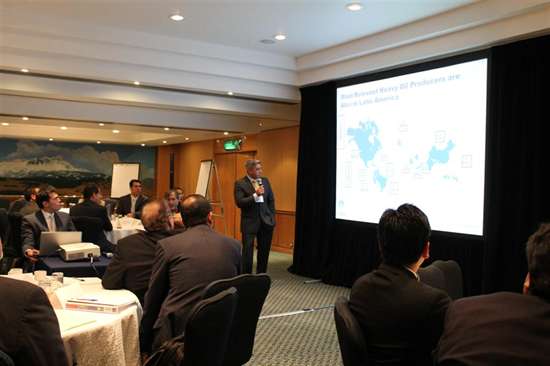
 The Heavy Oil Working Group (HOWG) serves as a forum for heavy oil producers and consumers in the Americas to exchange information on best practices and technological innovation. This group provides an opportunity to create a collaborative network of experts within the region, and gain a greater understanding of the potential of heavy oil. The members of this group are Brazil, Canada, Colombia, Mexico, Trinidad and Tobago, the United States and Venezuela. Through HOWG, Canada is sharing its expertise related to reducing the carbon footprint of oil sands/ heavy oil production with our hemispheric partners.
The Heavy Oil Working Group (HOWG) serves as a forum for heavy oil producers and consumers in the Americas to exchange information on best practices and technological innovation. This group provides an opportunity to create a collaborative network of experts within the region, and gain a greater understanding of the potential of heavy oil. The members of this group are Brazil, Canada, Colombia, Mexico, Trinidad and Tobago, the United States and Venezuela. Through HOWG, Canada is sharing its expertise related to reducing the carbon footprint of oil sands/ heavy oil production with our hemispheric partners.
Unconventional oil is set to play an increasingly important role in world oil supply through 2035, regardless of what governments do to curb demand. Non-OPEC countries will lead crude and liquid fuels production growth in the Western Hemisphere, especially by Brazil, Canada and the United States. Heavy oil will play an important role in the current and future energy mix of the region and globally and the Americas are the largest source of heavy oil globally. As the supply portfolio of our hemisphere is shifting from one dominated by conventional resources to one dominated by unconventional resources, increased collaboration on heavy oil development, and mitigating the issues associated with this development is key.
To date, three HOWG meetings have taken place. The first HOWG meeting took place on March 14, 2011 in Edmonton, Alberta. The second HOWG meeting was held on August 1, 2011 in Bogotá, Colombia, and the third meeting took place on April 19, 2012 in Mexico City, Mexico. Public and private sector representatives from Canada, Colombia, Mexico, Trinidad and Tobago, Brazil and the U.S. have taken part in these meetings. General feedback from participants was that the Working Group was an informative and interesting forum for discussion on heavy oil issues. They also noted that it would be useful to tackle specific topics such as identifying common barriers to heavy oil development in the Americas, technology collaboration schemes and incentives for heavy oil development.
 The group is emphasizing data sharing and transparency, encouraging countries to share data on their industries – which gives a clearer picture of what each country is doing (or not doing) in terms of their policies and regulations. The issues discussed link in with the work that has been done with Natural Resources Canada (NRCan) and Environment Canada (EC) in developing nationally appropriate mitigation actions (NAMAs) for reducing greenhouse gas (GHG) emissions in the oil & natural gas sectors in Colombia and Mexico. This work in Colombia and Mexico, and the resulting NAMA plans, is founded upon expertise developed under NRCan’s CanmetENERGY-Devon Upstream Petroleum Air Issues Research Initiative (UPAIRI) program.
The group is emphasizing data sharing and transparency, encouraging countries to share data on their industries – which gives a clearer picture of what each country is doing (or not doing) in terms of their policies and regulations. The issues discussed link in with the work that has been done with Natural Resources Canada (NRCan) and Environment Canada (EC) in developing nationally appropriate mitigation actions (NAMAs) for reducing greenhouse gas (GHG) emissions in the oil & natural gas sectors in Colombia and Mexico. This work in Colombia and Mexico, and the resulting NAMA plans, is founded upon expertise developed under NRCan’s CanmetENERGY-Devon Upstream Petroleum Air Issues Research Initiative (UPAIRI) program.
A fourth HOWG is being planned for late 2014 and will allow the working group to continue their work in the areas of sharing best practices in the area of heavy oil extraction and development; encouraging transparency and data sharing among countries; and discussing ways to minimize the upstream environmental footprint of the fossil fuels extraction process.
 View Map
View Map